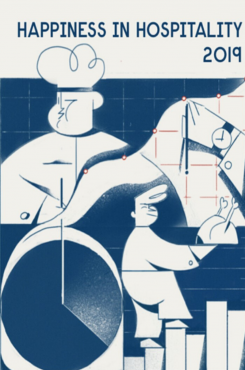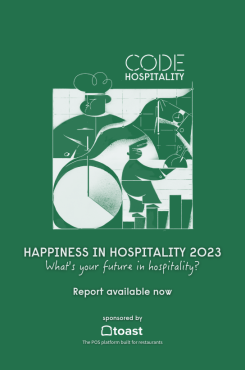Happiness in Hospitality 2020/21
Published 24 March 2021
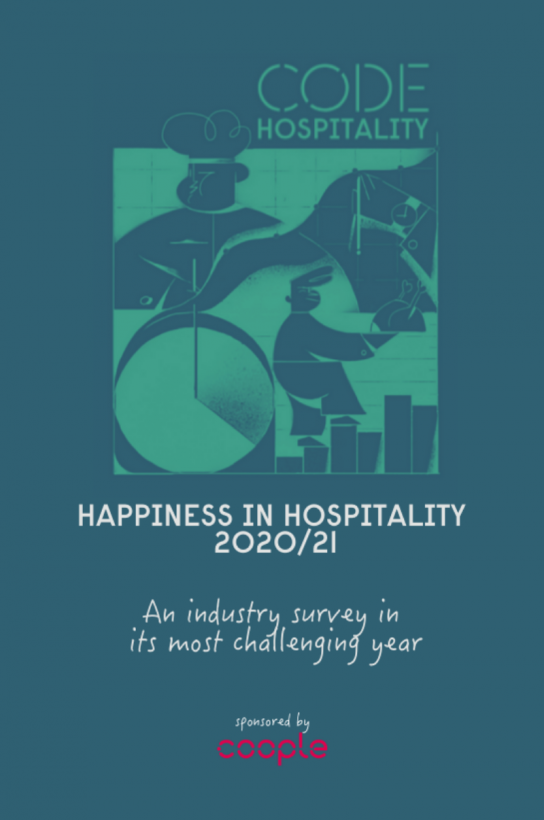
An industry survey in its most challenging year
Sponsored by
Click here to download the full report
Contents
2020: a year like no other
Happiness in Hospitality 2019 vs 2020/21
The impact of COVID-19
Diversity in the workplace
– Black Lives Matter and hospitality
Wellbeing in the workplace
– Support networks
Progress in the industry
– No-shows
– The Brexit effect
Expert voices reflect on 2020
What’s coming next for hospitality
– Bouncing back
– Flexible working
– Technology
Happiness in Hospitality: the bottom line
A note from our founder
It’s been hard to fathom what’s happened over the past year. Our personal lives have changed dramatically as have our working worlds. If someone this time last year had told me that there was this was mysterious virus about to spread around the globe that would mean we were ordered by the Government to stay at home, hospitality mandated to close for months upon end and our lives pretty much turned upside down, we’d either tell the person to take their cliched movie script to Hollywood or that it was time for home as they’d maybe had one too many espresso martinis. Yet here we are, pretty much exactly a year on and as hospitality folk we find ourselves in what has been, to put it bluntly, a bloody awful 12 months.
Over the past year I’ve tried to explain to people outside of our industry just what it has been like. This industry isn’t as easy as just working from home. That’s not possible. That’s not what we do. We bring people together, we encourage conviviality. We’re social animals. Being locked up for months on end is strange for anyone but for hospitality – this has been alien. We thrive on interaction, people, the human touch – it’s why we work in this industry. We don’t do lockdowns. We love going to work. We don’t want to be at home – it’s not for us.
Yet, I look around and I’m in awe. In sheer, jaw-dropping, pinch myself, can you actually believe it, awe that as an industry we’re still here. There have been casualties. Heck there’s even been success stories. But do you know what, first of all, we should pat ourselves on the back (social distancing and all that) and look at what we’ve (nearly) come through. We’ve seen businesses pivot, we’ve seen new businesses started to replace old ones that simply are no longer viable, we’ve seen operators contribute all revenue to cover staffs’ wages and we’ve seen the unbelievable generosity of hospitality looking after key workers. It’s quite unbelievable.
I was apprehensive about doing a Happiness in Hospitality survey this year. Let’s face it, it ain’t been a happy year. But sometimes, in fact all the time, we must hear the truth. And if it’s ugly then so be it. Because the whole point of this annual report is to make our industry a better place, and a stronger one. We can only do this by learning from the past year and everything it’s shown us. We were all in it together. But together, we’re stronger. And a stronger, more united industry can only be a better thing for us all.
I hope you enjoy this year’s report and find it useful whether you’re an employer, employee or just someone who loves the industry as much as we do. A special thank you to everyone from our community who completed the survey – without you there would be no report. And to everyone who worked with us on it.
I’d like to you leave you with a thought from our staff writer Harriet Prior, who put together this year’s report: “At CODE, we’ve always recognised how generous, kind, and wonderful the hospitality industry is – but over the past year it has become more evident than ever. Our annual Happiness in Hospitality report both celebrates this brilliance, as well as recognising the work still to be done. We hope the report symbolises a step in the right direction towards creating an inclusive, diverse and better industry for everyone working within it.”
Wishing you a sociable remainder of 2021.
Adam Hyman
Founder, CODE Hospitality
2020: a year like no other
The last 12 months have been the most challenging the hospitality industry has ever faced. The backdrop of Brexit and rising costs for operators at the start of 2020 was made immeasurably more difficult by the arrival of a global pandemic. With constantly changing restrictions, three lockdowns and a tiered system forcing hospitality businesses to open and close with less than 24 hours’ notice – coupled with limited financial support from government for businesses and their staff – many restaurants across the country have been forced to permanently close their doors.
However, in the face of adversity, hospitality showed how incredible an industry it really is. In September 2020, we published our Lockdown Heroes list, to champion those who helped us and others through a difficult time – from those who raised thousands for charity and helped to feed the vulnerable to those who kept us entertained online. Many operators also showed their ability to adapt and react to the ever-changing situation, quickly pivoting to create online retail shops, sell produce and create at-home kits to keep their business afloat.
One positive to take away from the past year is the growing number of new businesses created to help restaurants sell directly to consumers, including Restaurant Kits, Big Night and many more. These platforms have offered restaurants an opportunity to reach consumers nationwide and outside of their usual market; we expect this to continue as a valuable alternative revenue stream once hospitality can reopen its doors.
As hospitality companies were forced to keep face-to-face contact with customers to a minimum, the importance of technology was more evident than ever before. Traditional menus were swapped for QR codes, customers were temperature-checked and ordering online from the table became the norm. Whilst the industry has been forced to embrace technology, we believe the importance of the human touch in hospitality remains vital and will continue to do so.
In another paradigm shift, the death of George Floyd last May sparked global protests, which brought necessary attention to racism and inequality that continues to persist in society, as well as the hospitality industry. Both individuals and businesses were forced to consider whether they were doing enough. 75% of our survey respondents said the Black Lives Matter movement made them more aware of the issues in their own workplace. However, it will take time and commitment to create real change.
At the time of writing, we are still five weeks away from outdoor hospitality reopening in England. This is followed by indoor hospitality, earmarked to reopen on 17 May, and a wider return to normality from 21 June. As an industry, we will no doubt face more challenges along the way. However, we expect the final six months of 2021 to be busy for hospitality as society reopens. We will continue to learn from the past year.
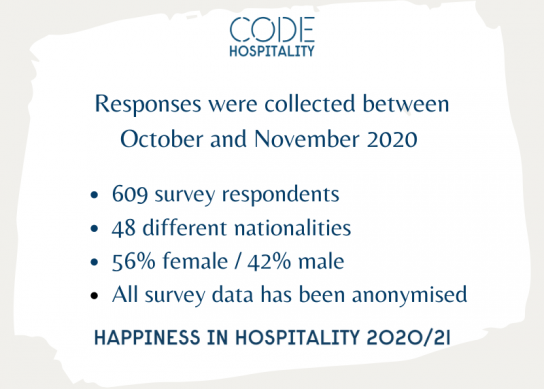
Happiness in Hospitality 2019 vs. 2020/21
A snapshot of how our industry has changed over the past 12 months.
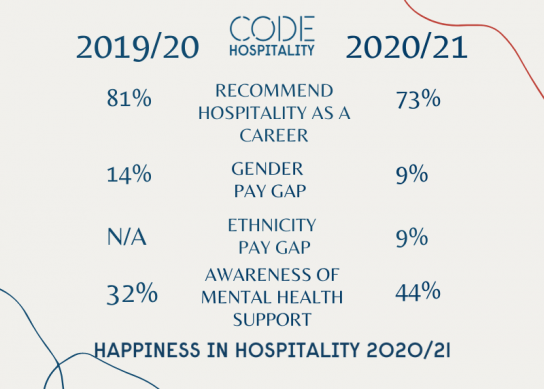
Despite the ongoing difficulties facing the industry, it’s encouraging to see that 73% of respondents would still recommend hospitality as a career. However, this figure is down from 81% in 2019, impacted by reduced job security, lack of governmental support and the industry having to shut down due to COVID-19. It’s also positive to note that 66% of respondents were attracted to hospitality as a career because of their passion for the industry, indicating that hospitality has not lost its appeal.
Whilst we maintain that careers in hospitality are about more than just a pay cheque, the median salary among our respondents is £34,750, above the national average of £31,461 in 2020. The gender pay gap across the CODE community (focussed on the mid-to-high-end independent sector) has decreased from 14% in 2019 to 9% in 2020, better than the average gender pay gap in the UK of 15.5%. However, the pay gap does worsen when you look at back-of-house (BoH) roles, where it stands at 17%. Additionally, whilst there are almost double as many women in head office roles than men, the men who are in head office roles are more likely to earn more. There was also a 9% ethnic wage gap among our respondents, indicative of the work to be done when it comes to pay transparency and equality.
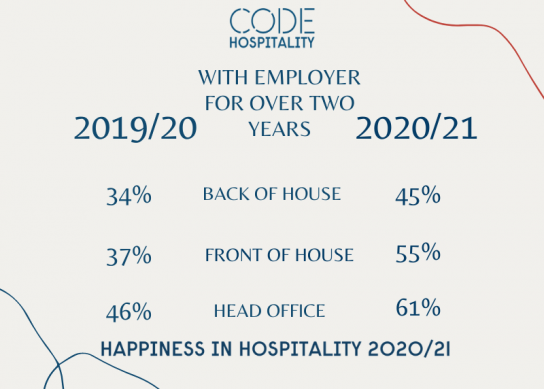
Pay discrepancy amongst back-of-house staff remains high, however staff retention has improved. 45% of BoH staff have been with their current employer for more than two years (up from 34% in 2019 and 31% in 2018), yet the median number of years spent with employer remains low at 1.8 years, suggesting staff turnover continues to be a problem.
Both the 2018 and 2019 Happiness in Hospitality reports highlighted the lack of mental health support within the hospitality industry, with just 21% of employees aware of a mental health policy in their workplace two years ago. Over the past couple of years, particularly as the importance and destigmatising of mental health has continued during the pandemic, it seems employers have started to take note. 44% of respondents were aware of mental health policies in the workplace, representing a step in the right direction – although there is still work to be done.
The impact of COVID-19
An industry that exists to bring people together, the hospitality industry has been one of the hardest hit by the pandemic. When we entered the first lockdown in March 2020, restaurants, pubs and bars were forced to close their doors and the industry was thrown into disarray. With the job retention scheme excluding tronc payments, many employees were receiving much less than 80% of their normal take home pay.
Hospitality businesses reopened in July 2020, and the two-metre rule was reduced to one-metre to give restaurants the best chance of survival. Wearing masks and visors became the norm, as did track and trace for customers. 86% of respondents agreed or strongly agreed that sufficient measures were put in place to make their workplace COVID secure, with figures consistent across all seniority levels, showing the industry’s commitment to keeping both its staff and customers safe.
With a rise in cases in September, hospitality once again took a hit, as a 10pm curfew for restaurants, pubs and bars was introduced, later followed by a tier system. Hospitality businesses were forced to close once more and adapt their offering. Throughout this it has sparked innovation, with 88% of our respondents agreeing that their workplace adapted since March 2020, with many turning to at-home kits, retail, delivery and takeaway options, showcasing the creativity and resilience of the industry.
Jyotin Sethi
CEO, JKS Restaurants
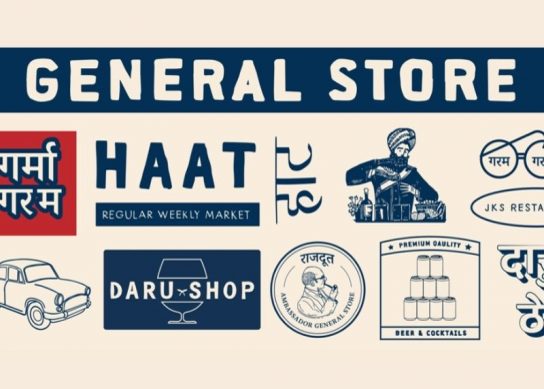
“It’s definitely been the hardest year we’ve gone through as a business, but necessity is the mother of invention and our need to find alternative revenue streams whilst our restaurants have been closed has meant we’ve created new aspects to JKS which are now here to stay. Whilst setting up delivery for almost all our existing brands was the first step, we’ve also created new takeaway-exclusive brands, and moved into nationwide delivery of cook-at-home kits.
Challenges have been around almost every corner, but one of our biggest was making sure that our brands weren’t diluted and that our guests could faithfully recreate the restaurant experience at home. So, whether that’s test-driving dozens of different sorts of packaging so we know your food will arrive looking and tasting perfect, recording our chefs cooking their kits live so you’ve got a visual preparation guide, or curating playlists for you to listen to as you enjoy your takeaway or cook your feast, we’ve really tried to go the extra mile.
It’s taken us a while to get to this point (we spent almost the whole of the first lockdown setting everything up) but at the end of the day, we’re a better business for it. We’ve learned a lot and our business model is no longer reliant on a single revenue stream – so there are positives to be found.”
With staff placed on furlough for much of the year and an alarming number of closures across the country, concerns over job security mounted. 80% of our respondents agreed that their job security had decreased during the COVID pandemic, with 52% saying that their employment status had changed during this time – junior staff were the most affected (69% of junior staff vs 39% of senior management).
However, 74% agreed that they received sufficient support from management during the pandemic, with many noting how emotional support and receiving reassurance from management was vital. Clear channels of communication were also deemed to be very important.
Madeleine Geach
Head of culture, Hawksmoor
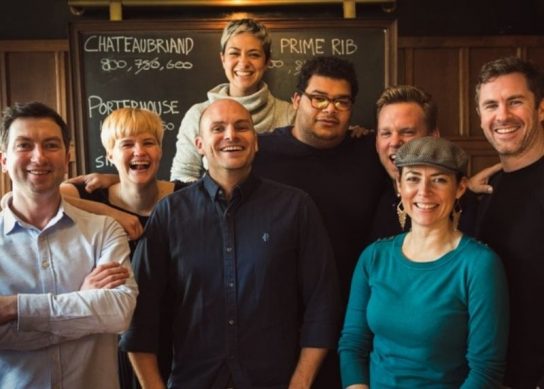
“Over the course of the pandemic Hawksmoor focussed on providing wellbeing support (running weekly wellbeing workshops on topics like resilience and developing healthy habits and sharing resources such as tips to help with loneliness) and practical help (like clear information on pay over closures so people could plan ahead and advice on how to budget or find a second job).
We used our comms platform (‘Workplace by Facebook’) to share all this information, and shared regular Friday video updates from our co-founder Will, aiming to give people as much clarity as possible in a time on uncertainty. People know they can depend on a video from Will straight after each government update to explain how this would affect them. There was fun stuff too: our virtual run club who made it to New York, photography group, budget cookalongs and cocktail competitions.
As well as plenty of opportunities to keep busy for those with time on their hands: like free courses in management development or bar skills. People could also get involved in our huge ‘Helping Others’ project, as part of which around 100 people at Hawksmoor cooked 30,000 meals for the NHS and vulnerable groups.”
With a competitive job market, increased redundancies and a lack of job security, 72% stated that they need to broaden their skillset. This figure highlights how COVID-19 will have a long-term impact on the workforce, with employees looking to broaden their horizons in order to be able to adapt to any situation.
Michael Perry
Head of hospitality, Coople
“As a result of COVID-19, uncertainty from Brexit and reduced business budgets, we are seeing a significant preference in the market towards hiring temporary workers. Economic uncertainty is top of mind for many businesses – hiring companies are now increasingly reliant on flexible, temporary workers to navigate through fluctuating demand, protect budgets and maximise profits. With the rising demand for temporary staff, workers are following the trend to embrace the new short-term job opportunities that are emerging in the market. These flexible placements not only offer hospitality professionals the freedom to survey the labour market for new openings, but also gives them the opportunity to learn new skills and maintain a healthy work-life balance.”
From an operator’s perspective, one major challenge has been meeting rent payments and with limited financial support from the government, much of the negotiation has been between the business and landlord. The government protected businesses from eviction, introduced a rent moratorium, and provided grants. However, for many hospitality operators in major cities – where annual rents exceed £100,000 per annum – the grants amounted to less than three weeks rent. At the time of writing, the government has extended the rent moratorium until 30 June 2021.
Camilla Topham,
Co-founder, Distrkt
“The commercial rent moratorium was a much needed and well-received endeavour for the hospitality industry, however as its third extension is confirmed, there is a sense of putting off the inevitable. This does not solve the issue of unpaid rent which is a matter to which the Government has made clear they do not wish to intervene. Once the moratorium ends, we anticipate a flood of property onto the market that we are not yet seeing and coupled with the end of the JRS scheme, then will we see the true fallout of the pandemic.
Many landlords have been proactive in their approach, supporting the tenants that are vital to the vibrancy of their estates and developments. We have seen such landlords working with tenants and this collaborative basis is the foundation for future successful relationships. Landlords are gaining a greater understanding of the tenants that are going into their holdings and by doing so are creating sustainable partnerships, which will last well into the future.
This is reciprocated by tenants who are also considering carefully who they are contracting with and both with look to one another’s behaviour and performance during this pandemic. This approach, based on a greater knowledge and understanding, will prevent further voids as middle ground is actively sought. Collaboration and partnership will define the successful landlord and tenant relationships of the future.”
Diversity in the workplace
Diversity and inclusion in the workplace are vital to ensure that all employees feel accepted and valued and should be a priority to all businesses. Companies that make diversity a priority benefit from a variety of ideas and perspectives, and evidence has shown that workplace diversity makes companies more effective, successful and can lead to greater profitability.
Here we look at diversity across key factors, include gender, ethnicity, age and sexual orientation and consider the hospitality industry’s response to the Black Lives Matter movement. We also look forward and examine how companies can adjust their hiring process to make sure they are attracting talent from the diverse range of people and skills that exist in society.
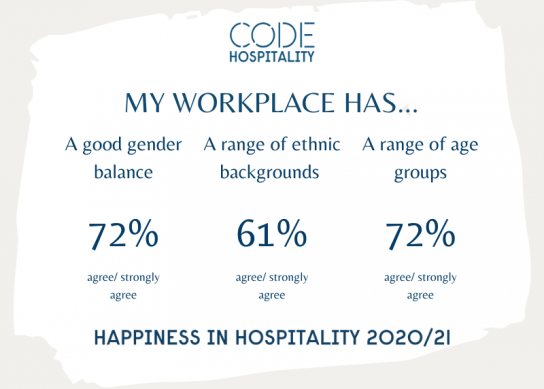
While the majority of respondents still agree that there is a diverse range of ages, genders and ethnicities in their workplace, these figures are all down from last year. Even though consumers have access to a diverse range of cuisines and experiences, some hospitality businesses are still not tapping into the wide-ranging talent pool in society. This may be in part because companies have not had the opportunity to hire new talent this year.
On a positive note, 93% of respondents agreed or strongly agreed that the hospitality industry is a safe space for the LGBTQ+ community, highlighting that hospitality is working to become an inclusive industry for all.
Hugh Wright
Founder, Hugh Richard Wright
“93% is a phenomenal figure, and one that is reflected in there being people from across the LGBTQ+ spectrum visible in prominent roles across hospitality. Too often, companies and industries consider themselves to be inclusive for ‘LGBTQ+’ people, when what that actually means in practice is ‘gay men’. But without even trying I – a gay man – can think of lesbian, bi, trans and queer friends also working in hospitality, and therefore it doesn’t surprise me that such a high percentage of respondents feel our industry is a safe space for the LGBTQ+ community.
Of course, we must never rest on our laurels and it’s vital that leaders in the industry are constantly looking at their businesses and asking if they are safe spaces for LGBTQ+ staff to work and express themselves in, in complete safety, immediately addressing any discriminatory behaviour – from casual ‘banter’ to more overt harassment.”
Black Lives Matter and hospitality
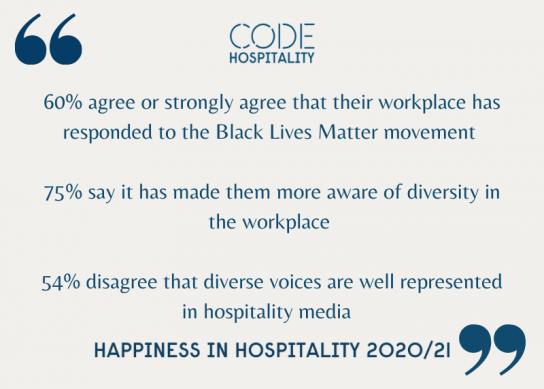
The death of George Floyd in May 2020 brought necessary attention to the injustices that continue to exist in society and forced both individuals and businesses to consider whether they were doing enough to help towards equal opportunity and fight systemic racism. 75% of our respondents said that the Black Lives Matter movement has made them more aware of diversity in the workplace, highlighting how it has impacted individuals’ mindfulness of the issues on both a personal and professional level.
While 60% agree or strongly agree that their workplace has responded to the movement, it is clear there is still a lot of work to be done. Many companies made commitments back in June, with some setting out clear guidelines explaining how they could tackle inequality in the workplace and ensure that they were actively hiring from a diverse talent pool, and in 2021 we will see whether real change is made.
According to the National Council for the Training of Journalists, around 94% of journalists are white, attributed to a ‘pipeline’ issue of how people enter journalism via higher education. This was reflected in our study, as 54% of respondents disagreed or strongly disagreed that diverse voices are well represented in hospitality media. Moving forward, media organisations need to ensure their newsrooms are reflective of society, and that starts with recruitment.
In order to attract new talent, hospitality businesses should adjust their hiring process to ensure it is fair and free of bias. Writing inclusive job descriptions that those outside your organisation can understand easily is important. Ensure you widen your search by sharing job openings on social media channels and a range of job boards and encouraging others to share too. Rather than stating you are an “equal employer”, go beyond that and actively encourage candidates from underrepresented backgrounds to apply.
CODE spoke to the founders of Black Book last year, a representation platform for Black and non-white people working in hospitality and food media, in September. With a mission to “inspire and empower through enhancing visibility, equality, equity and wealth creation worldwide within these communities”, Black Book shared how the hospitality industry can play its part. We also hear from Lorraine Copes of Be Inclusive Hospitality, who shares the importance of amplifying voices and visibility.
Zoe Adjonyoh, Frankie Reddin & Dr Anna Sulan Masing
Founders, Black Book
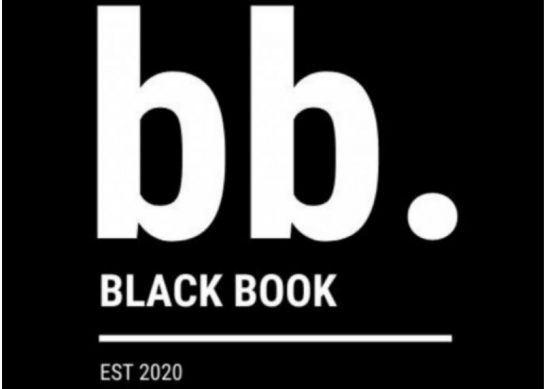
“Diversity can be an empty word, an array of different people at a workplace might offer a better outcome to businesses, but without structures changing then the space isn’t safe and interesting work won’t happen. The lack of diversity in the food and drinks world is because it is a colonised one, which centres the white experience / lens / culture; this centring puts less value on anyone – including their food – outside of that ‘norm’.
Therefore, individuals should be looking at ensuring safe spaces so that people feel empowered to speak up, to make changes when necessary and to feel comfortable in challenging their own norms.
It is also about understanding that “these communities” are part of “your. community”. Black and non-white people are everywhere in the food world, at every level – supporting those people is about supporting the industry. It can be as simple as recognising the input of Black and non-white people in the industry. It is about looking at the staff make-up of an organisation and questioning why certain individuals are not being promoted. It is about recognising histories and talking openly about them. It is about platforming, supporting, showcasing and encouraging voices that are less heard. And, it is about active listening.”
Lorraine Copes
Founder, Be Inclusive Hospitality

“Be Seen. Be Heard. Be Valued. Communities are made up of a group of individuals, and individuals all want to be seen, heard, valued and consequently connected. Layer on top of this, the past 10 months of separation, isolation, and income disruption, our need for this has certainly increased.
Since Be Inclusive Hospitality (CIC) officially launched in July 2020, we have been able to bring together a community of 4000+ Black, Asian and Minority Ethnic individuals and allies by filling a long vacant gap within the sector. We have worked to amplify voices and visibility, through a series of web panel events including The Colour of Wine, and will continue to share knowledge, following on from the launch of the Elevate Mentorship Scheme. By joining our community, relationships have been forged, safe spaces created, and we have had fun too, which has helped many to cope during this incredibly difficult time.
Hospitality, and food and beverage organisations have also joined the community, those who pledge to drive change through doing the work with our Equality, Diversity & Inclusion team. This has included self-reflection, culture audits, training, accelerator schemes and planning forward. The best thing of all about community, is there is a way that you can all Be Involved.”
Wellbeing in the workplace
As the saying goes, happy staff equals happy customers. One of CODE’s primary motivations for starting the Happiness in Hospitality report in 2018 was to try and understand what makes people happy in the workplace. In a challenging year for both hospitality businesses and staff, it is more important than ever for employees to feel like their mental health is of paramount importance to their employer. 72% of respondents said that their mental health has suffered as a result of the pandemic, with factors including reduced job security, loneliness, being furloughed and redundancy all playing a role.
What was clear in this year’s survey is staff are more likely to experience verbal abuse from customers than colleagues.
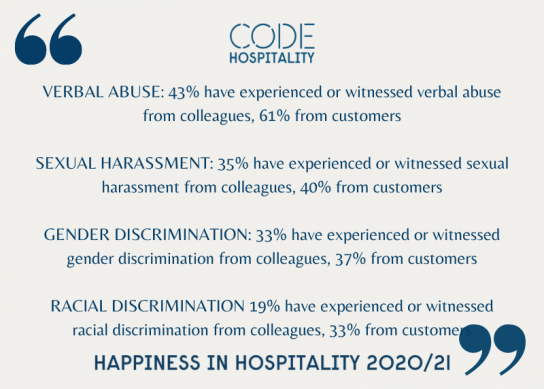
The figures are quite staggering and show how those working in the hospitality industry are still subjected to a large amount of abuse and discrimination from either/both fellow colleagues and notably customers. More than ever, it’s vital that employees feel safe and comfortable in the workplace, and that they have clear support systems in place to be able to report discrimination or air their concerns.
Tobie-Anna Durk
Founder, Kelly’s Cause Foundation
Kelly’s Cause Foundation is the only provider of hospitality-specific Mental Health First Aid training and is on a mission to create a mentally healthy hospitality industry for all.
“Pandemic or no pandemic, there are many ways hospitality businesses can support the mental health of their employees and ensure a mentally healthy workplace. The sector is known for being a challenging working environment, but one that can thrive and bring the best out of its employees with the right, supportive working conditions.
The basics to securing a mentally healthy workplace come down to communication, something we are familiar with when it comes to customers, but not always internally as a team. Regular team meetings, acknowledging employees’ hard work, and checking-in informally are small steps you can take to let your employees know that their mental health is important. Ultimately, having a trained Mental Health First Aider and an active Mental Health policy within your organisation is the best way to look out for the mental health of your team, and of the wider community.
Training in Mental Health First Aid provides an opportunity for someone to build their confidence and learn essential skills in preventing a mental health crisis. Mental Health First Aiders are trained to spot the warning signs, listen actively and non-judgmentally, and signpost to appropriate resources. They act as a point of call for anyone who may be experiencing poor mental health to seek support. This role can be taken on by anyone and is a signal to your staff that you care.”
It is positive to note that 44% of respondents are aware of a mental-health policy in the workplace, up from 30% in 2018 and 31% in 2019, highlighting that businesses have been proactive in responding to the mental-health concerns of employees during the pandemic. However, 26% said that they weren’t aware if their employer has a policy in place, suggesting that senior staff may not be effectively communicating internal support mechanisms to junior staff.
Despite that, it was encouraging to see that 70% of respondents feel comfortable asking their employer for support, with many operators setting up portals, group chats and regular check-ins during the pandemic to ensure that staff stayed connected and had the opportunity to express their concerns.
Support networks
Both personal and industry support networks have played an important role during the pandemic, as the community has come together to share information and fight for the concerns of the hospitality industry to be heard. For example, a petition arguing that there should be a dedicated minister for hospitality was signed by more than 200,000 people at the time of writing. This was then debated in January and MPs voted in support of the motion. No further action has been taken yet.
Those that work in hospitality are already part of a community in our opinion, so it’s positive that 57% of respondents say that the industry has helped to support each other through this time. However, only 24% said that they had formally joined a support network. With a clear eagerness to support others in the industry, this is likely due to a lack of awareness of support networks. Employers and the media could help by sharing information with their community, and support networks should also work to ensure that their networks are inclusive.
Mark Lewis
Chief executive, Hospitality Action
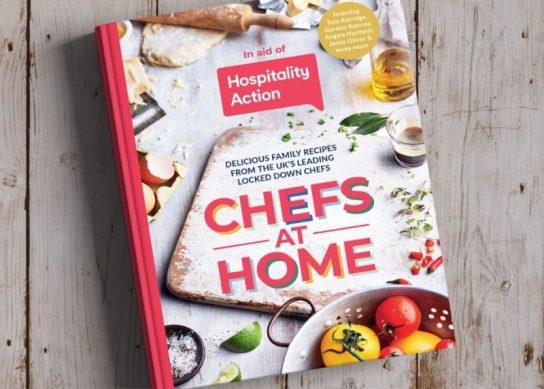
“In his foreword to Hospitality Action’s Lockdown recipe book, Chefs at Home, our Principal Patron Jason Atherton says that “no other industry sector can boast the same camaraderie as hospitality. We’re a family, a band of brothers and sisters … We work hard together, and we play hard together. Our sense of professional purpose is built upon providing pleasure to others”.
When lockdown hit the industry, last March, hospitality people not only lost their employment, but they also lost access to their networks of friends, colleagues and clients. For many, it was disconcerting, bewildering even. Starved of the face-to-face connections hospitality workers thrive on, they looked elsewhere – social media, podcasts, webinars – for a sense of community.
At Hospitality Action, we did our best to help. The guts of our work is providing grants to people in difficulty or crisis. But we like to think we also provided a sense of community for people untethered from their professional networks.
We’ve worked hard, through our Covid communications, to create a sense that we’ve got a supportive arm around the industry. It’s why we use the hashtag, #wevegotyou. We’re the industry’s safety net, we’re here to catch you when you fall. I know, enough metaphors, already.
There’s reassurance in being part of something that’s bigger than you. That’s why over 500 people chose to participate in our 20,000 Mile Challenge last summer, in which we combined all the miles participants walked, ran or cycled to virtually tour the coastland of the United Kingdom. Even though people exercised alone, they told us they enjoyed being connected to a network of like-minded people for the five days the challenge ran.
It’s been gratifying to see a network of new friendships being forged on social media, this past year, with HA at its hub. Like everyone else we look forward to cementing these friendships with shake of the hand and a glass of something cold, when the world starts to turn again.”
Progress in the industry
No-shows
Amidst the backdrop of the pandemic, it is easy to forget other issues and trends in the hospitality industry over the past year. In 2020, attention was particularly drawn to the impact of no-shows. With many businesses putting their efforts into reopening safely and surviving the pandemic, diners failing to turn up to their reservations had a crippling impact on operators.
Tom Kerridge initiated a conversation in July 2020, writing that 27 people booked into Kerridge’s Bar & Grill and failed to turn up, and other operators were quick to share their stories. The latest figures suggest that no-shows cost the industry £16 billion a year. In response, hospitality recruitment consultancy Sixty-Eight People and Gusto Restaurant Group created a #NoMoreNoShows campaign in Greater Manchester, aiming to highlight that attitudes need to change, including apparent embarrassment about cancelling.
They asked diners to follow three simple steps:
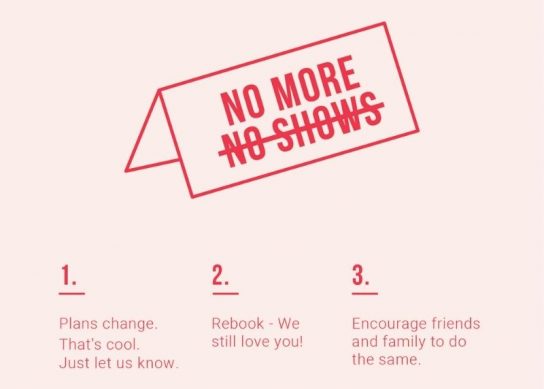
77% of our respondents agreed or strongly agreed that the number of no-shows increased in 2020, but only 26% agreed that their workplace has an effective policy to deal with them. Some examples of these policies included:
“Retain deposits if table no shows”
“Charge no-shows and late cancellations”
“Hold a table for no more than 15 minutes”
“Call on the day to check if they are still coming”
“Retain customer details in a black book, if they decide to rebook”
“The first night is chargeable for rooms”
Lucy Noone Blake
Hospitality consultant, Pear Communications
“No More No Shows, the brainchild of People Expert Abi Dunn of Sixty-Eight People and Antonia Lallement of Gusto Restaurant Group, was an impassioned response to the devastating financial implications of ‘no-shows’ to restaurant businesses across the country.
Abi realised that the only way to change consumer behaviour was to help operators explain to their customer base the impact of what might feel to them like a relatively minor indiscretion.
The idea grew quickly from a tweet on Antonia’s personal account – restaurants expressing sympathy and members of the public expressing shock at the knock-on effects of not showing up for reserved tables.
Launched collaboratively across social media with a tile designed by Manchester’s Lit Marketing, Abi and Antonia caught the attention of the country, making every newspaper, shared and promoted by high-profile chefs and operators and culminating in a national billboard campaign.
The tweet was shared 12.5 million times… and CGA reported a significant change in consumer behaviour.”
The Brexit effect
The UK officially left the European Union in January 2020, following years of negotiation. 53% of our respondents agreed or strongly agreed that their workplace was prepared for Brexit, but there are fears that the pandemic has detracted from the significance of Brexit and meant that businesses aren’t fully prepared.
As most of the UK food safety laws stem from EU legislation, Brexit has potential implications for food safety, as well as staffing issues and worker’s rights. As the hospitality industry relies on workers from across the continent, the changes in laws can be particularly concerning for businesses. Businesses must be aware of visa issues and recruitment, as well as higher travel costs for those in the hotel industry.
Alex Mizzi
Legal Director (Employment), Howard Kennedy
“It’s been a grim 12 months for the hospitality industry. But for all the challenges of the pandemic, Brexit may have a longer-term impact. As hospitality businesses prepare to reopen, how does Brexit affect staff planning?
Under new immigration rules business cannot longer rely on incoming EU workers to fill roles paid at or near minimum wage. This may mean higher wage costs to attract UK nationals (although higher unemployment may counter this) or using apprenticeships to plug local skills gaps. The Government-funded Kickstart scheme for youth workers is another useful option. Alternatively, tech solutions like mobile ordering apps may help to manage staff costs.
It’s equally important to ensure existing EU staff apply for settled status and to adjust your right to work checks and recruitment processes to reflect the new immigration rules. There are some tricky issues around right to work checks for EU nationals prior to 1 July 2021, and employers may need specialist advice on this.”
Experts reflect on 2020
With the door now firmly closed on 2020, leading industry figures reflect on the ups and downs of the past year.
James Cochran
Chef patron, 12:51 and Around the Cluck
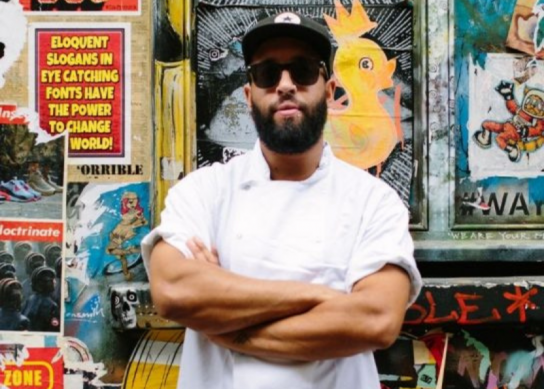
“It’s safe to say 2020 was a year of highs and lows. But it’s a challenge I’ve faced head on with a brilliant team behind me. Keeping the team positive and safe has always been a top priority and it meant that most of the year, me and my business partner Dan have been right there at the front.
While the COVID-19 pandemic, and the government’s handling of it, threw us so many curveballs I’m proud of what we have achieved in difficult circumstances, not just with the pandemic but in other areas such as diversity and speaking out too.
It’s been a year to think on our feet. Whatever came at us, I’m happy to say, the team managed to move quickly to execute a new plan of action. From Around the Cluck to our collaborations. We worked hard to get our takeaway concept Around the Cluck up and running and it has gone from strength to strength. It’s still a thrill to see our fans post every week, whether they’re ordering from us from the 12:51 base or ordering our at-home kits and recreating.
We recently changed it up again with guest chef collaborations – we’ve had Tom Brown and John Chantarasak so far with more to come – and it’s such fun. It’s helped bring some of the old buzz of cooking pre-pandemic to the table too.
Until we can open our doors again, we’ll be working, and adapting, and coming up with new ways to keep things feeling fresh and of course, banging in the taste department, too.”
Robin Gill
Founder, Bermondsey Larder | Sorella | Darby’s | Rye by the Water | Birch
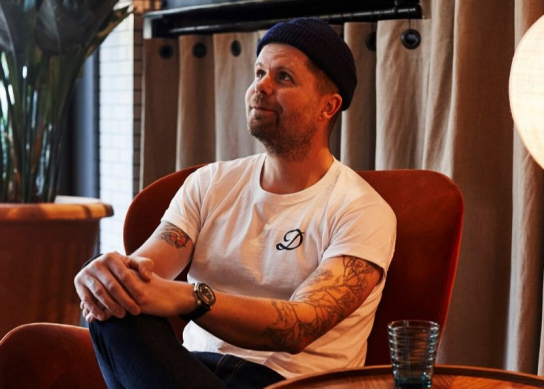
“Wow. Well I’m a serious optimist and even I have struggled to cope with many of the bumps in the tremendous rollercoaster 2020 has been. From closing our first home The Dairy – our son Ziggy honestly thought that I lived there – if we passed in a car, he would point and say, “there’s Daddy’s house”. But then through the kindness of Eric Jafari we managed to keep all our team and found a new home in Bermondsey.
Throughout the first lockdown I was truly astonished at the human kindness our hospitality showed to each other and those also in need. Our industry was left out in the blistering sun and hung to dry, yet we responded by cooking for others. The sense of community from within our own neighbourhoods was beautiful, we became humble and grateful for the simple things. The visits from friends in the business to Darby’s was a true highlight – yes, I did manage to sneak in a socially distanced Guinness or two where we would hide round the back and just sit in disbelief at the world, we were lost, but not alone. And that’s what kept me going.
I am pretty bored of packaging in general, when we opened the doors to Darby’s on the 4th of July to watch the restaurant fill, the clatter of pans, the flash of flames from the aged beef fat hitting the coals and looking out at Emma and the team weave in and out of all the truly grateful guests, it reminded me why I love this industry, why I love restaurants, hospitality, people!”
Elizabeth Haigh
Founder, Mei Mei & Kaizen House

“We had only opened Mei Mei for three and a half months before the first (of many) lockdowns, and it felt like we had to change and adapt as many times as needed to survive. We found out quickly we couldn’t rely on loans or grants because we didn’t qualify, but it also pushed us into working quicker towards developing our business.
We introduced our retail business, of producing and distributing our own products, our sauces, spice mixes and meal kits, then when summer came around, we were so excited to launch Bā, our evening supper club. It felt so good to serve food on actual plates and wine in glasses again, and being an outdoor restaurant, we felt we were being responsible too.
I can’t wait to have that feeling again of enjoying any hospitality. These lockdowns have made me realise how much of a therapy it is for me, to enjoy the company of others and feel relaxed. I’m also really looking forward to the launch of my book Makan too in May, I’m hoping by then we can have a proper book launch and eat lots from the book, and never see a Zoom class again!”
Brodie Meah
Founder, Top Cuvée
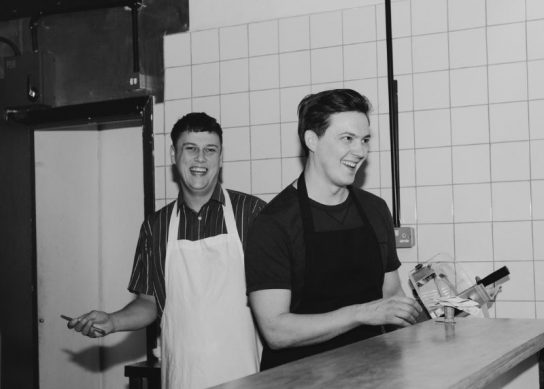
“This year work has been all encompassing. It’s been great to wholly devote myself to my business and customers, the level of focus you can achieve by having zero distractions was eye opening and I hope to maintain that in our post COVID-19 world. On the flip side, the lack of distractions has taught me how important it is to take a break when there’s so much going on. It’s easy to work 18 hours a day for weeks on end but you start to fade. Now I really appreciate a proper day off with my wife before returning with a clarity of mind.
Top Cuvée has been extremely agile in navigating the pandemic, our initial “pivot” was a great success, but we were constantly changing our business to suit the times and offering services that people really wanted. This was a big lesson and something we now hold at the core of our business.
Aside from all the self-education, a high point for me throughout the year has been watching how resilient and ingenious our industry is – all the pivots, pop ups, collabs, new businesses and general camaraderie has been an inspiration and a great reminder as to why I loved this industry in the first place.”
Chloë Hamilton
Head of partners & memberships, CODE Hospitality
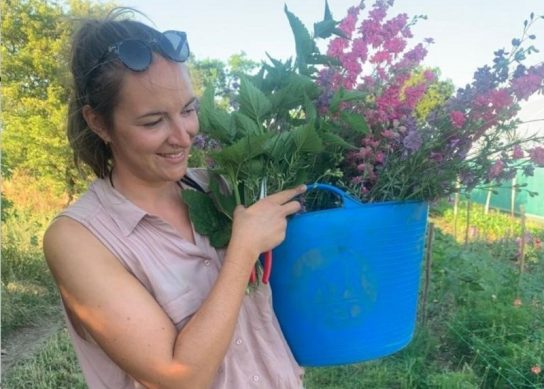
“In celebration of Chinese New Year 2020, the CODE team were huddled around a table picking over dan dan noodles and jellyfish salad from My Old Place, with the news of a virus a shadowy but distant concern.
It’s a good job we were innocent of what was coming, or we might not have made it through the year. The thought of the industry being closed 12-months on would have been too hard to swallow; the repeated stopping and starting, closing and opening, a mental mountain too hard to climb.
Hospitality can never truly be a digital enterprise, but the ingenuity of diversification to keep cash flowing, and the energy required to live to fight another day has been staggering. Not to mention the generosity of an impoverished sector in stepping up to feed the frontline, the homeless and the hungry. The year of the pandemic has shown that the hospitality industry possesses skills and attributes that many of those leading the country could only dream of.”
What’s coming next for hospitality?
At CODE we don’t believe in predicting trends, but this year we think it is important to look ahead to the rest of 2021 and beyond… and more positive times.
Bouncing back
It was encouraging that despite the challenges of the past year, 79% of our respondents were confident that their workplace would survive 2020. We can start to look ahead to the latter half of 2021 and think about the recovery of the hospitality industry and a return to normality.
With a clear appetite among customers for human connection and normal life, we can expect the hospitality industry to make a strong comeback when allowed to reopen again, following the pattern of countries which have loosened their restrictions, where hospitality has been quick to get back on its feet. With the roll-out of vaccinations expected to go on well into the year, it is vital that operators focus on safety and building customer confidence.
It’s important than even in difficult times we continue to fly the flag for the hospitality industry and fight to be heard. The petition for the minister for hospitality is a perfect example of how powerful the hospitality industry can be when we all work together.
Flexible working
While we hope to see the hospitality industry make a full recovery in the latter stages of 2021, one thing that is likely to permanently change is the way in which employees work. As the traditional 9-5 has disappeared across industries and work-life boundaries have become blurred, many hospitality staff in office roles are likely to want to retain an element of flexibility when we return to something like normality. Similarly, those in front- and back-of-house roles are likely to be more conscious of maintaining a healthy work-life balance, having spent time on furlough.
76% strongly agree or agree that they will pursue more flexible working patterns as a result of COVID
41% are more likely to consider short-term work
Michael Perry
Head of Hospitality, Coople
“Throughout the global pandemic, many hospitality workers have had to diversify their skillset and take up new opportunities across other industries. With the increase in demand across sectors such as retail and logistics, e-commerce and customer services, hospitality workers have adopted new roles to stay active in the job market. One of our findings has been that hospitality workers perform extremely well in other industries, especially those with customer service experience. Many were surprised at how transferable their skills are.
As we emerge from COVID-19 and venues open their doors once again, we expect to see new recruitment challenges. Businesses will need to work harder in order to bring back the hospitality workers who have found opportunities in other sectors and attract new talent into the industry. Businesses will also need to provide good training and development plans as workers continue to limit their risks in a post COVID-19 landscape”.
Technology
Prior to the pandemic, the hospitality industry had been criticised for its slow uptake of technology compared to other industries. However, many hospitality venues relied on technology to implement effective track-and-trace systems and ensure the safety of both customers and staff by reducing the amount of social contact. Some restaurants even offered contact-free services for customers who opted for it leading to a resurgence of the QR code. The rise and rise of meal-kits and delivery platforms has further accelerated technology adoption providing key alternative revenue streams. However, as we look towards a return to some semblance of normality, we hope human interaction in hospitality will also return. Technology has its place, but it can never replace human interaction, nor should it.
Simone Stewart
Head of sales & marketing, Propeller
“Technology is taking on a new role, morphing from a tool designed to maximise efficiency into a means of fostering meaningful customer relationships. So what is needed from digital in hospitality to thrive in the new reality?
Customers are now more comfortable interacting with brands in digital environments and their expectations have evolved with their habits during the pandemic. The gap between hospitality ‘IRL’ and online is wider than in other industries, particularly eCommerce. Modern, hyperconnected consumers expectations won’t accept lacklustre digital interactions. Brands need to be using technology to enhance customer experiences in an authentic way that maintains consistency across all platforms, not replace human interaction.
We will continue to see eCommerce inform what hospitality is doing online, for example extending the on-site experience online and expanding the bookable proposition. People are taking ownership of their booking journeys because of distancing restrictions.
Click and collect, highly custom group / area bookings and video driven consultation are all growing. Technology was key to driving people back into venues safely and facilitating additional revenue streams in lockdown. Now it can be key to expanding their experiences and growing hospitality once again. Investment in digital infrastructure will guide those who invest in these channels to stronger customer relationships and enduring business success in the post pandemic environment as well.”
Happiness in Hospitality: The bottom line
– In the face of adversity, hospitality showed how incredible the industry really is. From raising money for charity, launching meal-kits to launching new initiatives, businesses have proven their creativity in the face of challenges. 88% of respondents agreed or strongly agreed that their workplace adapted since March.
– Both the gender and ethnic pay gap in hospitality across the community stand at 9%, suggesting work still needs to be done. Increased reporting, more transparency and reviewing promotion processes are all important.
– 44% of respondents were aware of mental health policies in the workplace, a step in the right direction.
– More workers in the hospitality industry are looking to broaden their skillset amidst decreased job security.
– Junior staff have been the most impacted by changes in employment as a result of COVID, however most noted they received sufficient support from management during the pandemic.
– Providing emotional support, reassurance and clear channels of communication is vital during this time.
– It’s vital that all employees feel accepted and valued, and this should be a priority to all businesses. However, some businesses are still not tapping into the wide-ranging talent pool in society, suggesting that recruitment processes need to be adapted. Sharing jobs on social channels and a range of job board and actively encouraging candidates from underrepresented backgrounds to apply are good starting points.
– 72% of respondents said their mental health had suffered as a result of the pandemic, and the majority said they feel comfortable asking their employer for support. Businesses can play their part by implementing good communication, checking-in informally, hosting regular team meetings and having a trained Mental Health First Aider on the team.
– Support networks help to the hospitality industry to share information and fight for the concerns of the industry to be heard.
– With no-shows on the rise, it’s important to have a policy in place, whether that’s retaining deposits, calling on the day or holding a table for a short length of time.
– As we start to look ahead to the latter half of 2021, with a clear appetite among customers for human connection and normal life, we can expect the hospitality industry to make a strong comeback.
– It’s important that we continue to fly the flag for hospitality during this difficult time and fight for the right to be heard.
Sponsored by
Coople is Europe’s largest digital staffing platform, connecting people with companies looking for flexible staff. With more than 100,000 registered workers, and 5,000 clients across multiple sectors in the UK, we match ambitious companies looking for skilled flexible staff in the hospitality, events, retail & logistics and office sectors.
Whilst flexible work can offer a great short-term solution, at Coople we’re focused on the long-term success of all our clients and workers. When flexible work is done right, businesses benefit from much more than reducing cost and covering staff absences. They get quality, motivated workers with the talent and drive to make a positive contribution to their company, no matter how long the working relationship lasts.
Within the hospitality sector, we help businesses hire a variety of roles across a range of skills and experience levels – including baristas, bartenders, kitchen assistants, waiters/waitresses, chefs, barbacks and more.
With COVID-19 lockdown restrictions finally beginning to ease, many hospitality businesses are planning their post-pandemic workforce. For businesses looking to maximise profit and protect budgets, flexibility will be key for successful growth and recovery. Whether you’re looking to reduce hiring risk or overcome operational gaps as the market re-opens, Coople provides an all-in-one staffing solution to help hospitality businesses future-proof their recruitment strategy.



